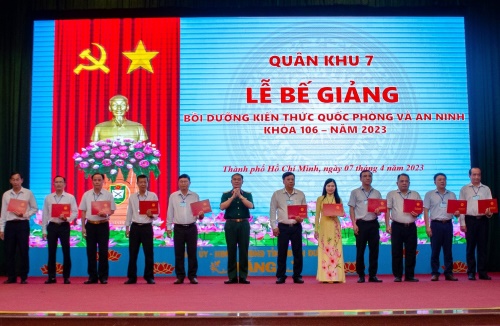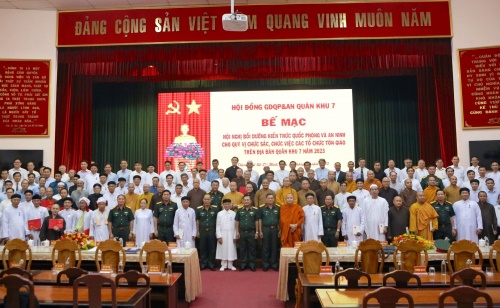Currently, in parallel with fostering non-commissioned officers, technical staff, and military cadres, the Military School of Military Region 7 is also responsible for cultivating national defence and security education for category-2 subjects, religious dignitaries, and educating in national defence and security for students from universities and colleges in the region as assigned by the Ministry of Education and Training. During the implementation process, in addition to advantages, the School has encountered numerous difficulties due to the enormous annual quantity of students with a variety of educational levels, ages, religious backgrounds, and job positions. Meanwhile, the teaching staff is insufficient; the professional qualifications of several comrades do not meet the task requirements; the facilities and teaching equipment are not synchronised, etc. Therefore, the School’s Party Committee and Board of Directors have been implementing multiple policies and measures to surmount all difficulties, bring into play their synergy, and improve the quality of national defence and security education for all trainees.
 |
| Closing ceremony of a defence and security course held by the school |
First and foremost, the School’s Party Committee and Board of Directors have concentrated on enhancing the roles and responsibilities of party committees and commanders at all levels toward national defence and security education. This pivotal factor ensures the serious implementation, the goals, requirements, targets, and plans. On the foundation of grasping the directives of the Council for National Defence and Security Education of Military Region 7, the School’s Party Committee has issued leadership resolutions and assigned tasks to its agencies and faculties, especially the Centre for National Defence and Security Education. For great effectiveness, the School has required its party committees at all levels, especially those of the Training Department, faculties, and the Centre for National Defence and Security Education to concretise national defence and security education into periodical leadership resolutions with specific targets and measures; assign tasks to presiding cadres to supervise and inspect the task implementation. Simultaneously, importance has been attached to specifying plans and action programmes to realise the resolutions; reviewing, rectifying, and supplementing the regulations to reach a consensus on directing and administering the courses; actively organising thematic conferences and seminars to bring into play democracy and collective intelligence in proposing measures to enhance the quality of national defence and security education. Annually, pursuant to the plans of the Council for National Defence And Security Education of Military Region 7, the Board of Directors has directed the Training Department to research and advise the School to coordinate with the provinces and units to check category 2 subjects; coordinate with universities and colleges to reach a consensus on the amount of time and the number of students; map out plans to foster trainees in accordance with the School’s capabilities. Accordingly, emphasis has been placed on directing faculties to restructure the staff and design lessons; directing the Centre for National Defence and Security Education to conduct preparatory work in all respects for students in accordance with the characteristics and defence-security tasks of the Military Region; allocating balanced knowledge in national defence, military, and security in accordance with each subject, especially cadres in localities.
The quality of education and training in general and the cultivation of national defence and security in particular chiefly depend on the teaching staff. Meanwhile, the subjects, especially category 2 subjects and religious dignitaries possess high theoretical qualifications and experience in leadership and management. This brings about advantages but requires the teaching staff to have corresponding qualifications. Thus, the School has placed immense emphasis on the building of a qualified and competent teaching staff to meet the demanding requirements of national defence and security education. Accordingly, the School’s Party Committee and Board of Directors have introduced multiple policies and measures to advise and propose to the Military Region and direct the building of the teaching staff with sufficient quantity, appropriate structure, qualifications, and competencies to satisfy the requirements of education and training in general and national security and defence education in particular. During the implementation process, the School has paid due attention to fostering comprehensive competence for the teaching staff through numerous approaches to create a favourable condition for cadres and lecturers to update knowledge and accumulate experience. At the same time, importance has also been attached to maintaining teaching excellence competitions at grassroots and school levels; opt and detach lecturers to take part in the competition at the Ministry level. This constitutes a pivotal approach to evaluate and categorise the annual quality of the teaching staff and cadres to lay a foundation for appointing and designing training plans. Moreover, the School has promoted exchange sessions with other military schools and universities to organise excursions and exchange experience; and implemented policy work so that cadres and lecturers can be encouraged to raise their learning autonomy, conduct scientific research, and enhance their pedagogic competence. Before courses, on the foundation of subjects, contents, and programmes, the School has selected and invited comrades in the Board of Directors, leaders of the Military Region, leaders of the public security forces from provinces, cadres of High Command 86, lecturers from People’s Security University, etc. and assign experienced cadres and lecturers from the departments and faculties to teach and inform several specialised topics regarding economic, social, defence, security, cyber security situations, etc. As a result, up to now, all lecturers of the School can deliver lectures on national defence and security as stipulated; and numerous comrades have achieved teaching excellence awards in the Teaching Excellence Competitions of the Centre for National Defence and Security Education. In the forthcoming time, the School will continue to consolidate and build the teaching staff and cadres and by the end of 2030, strive for 100% of the teaching and educational management staff to have proper university degrees; of which, 35% have postgraduate qualifications; 75% of the teaching staff go through command and management positions. Annually, more than 15% of the teaching staff are recognised as excellent lecturers at all levels to improve the quality of human resources and accomplish the central political tasks including the task of fostering national defence and security education.
 |
| Conducting defence and security education for religious dignitaries in the areas of Military Region 7 |
In addition, the School has directed the update and supplement of teaching contents and the renewal of teaching methods that accord each subject. The School has directed the Training Department to adhere to Circular No. 172/2020/TT-BQP issued on 30 December 2020 by the Ministry of National Defence, Circular No. 05/2020/TT-BGDĐT issued on 18 March 2020 by the Ministry of Education and Training to formulate plans to foster national defence and security education for each subject. At the same time, the School has also directed its agencies and faculties to keep track of the situation and update new contents concerning national defence and security, especially the viewpoints, guidelines, and policies of the Party and the State on military, national defence, security and safeguarding of the Fatherland. The School has required its faculties and the teaching staff to base the assigned specialised contents, combine theory and practice, attach importance to maintaining contact with reality, and apply to cadres, students, religious dignitaries, and military-defence tasks in localities and the political, economic, and cultural situation within the Military Region to constantly enhance the teaching quality. Focus has been put on acquiring new knowledge concerning military, national defence, and security and formulating various views in all dimensions on new and sensitive issues to reach a consensus and raise awareness of each subject, etc. Due to limited training time duration, the School has accelerated the renovation of teaching-acquiring methods; applied active teaching methods and the student-centred learning approach. In particular, importance has been attached to applying information technology into teaching; flexibly combining presentations with discussions and experience exchange sessions to overcome the traditional one-way knowledge transmission.
In addition to equipping theory, the School has balanced its training programmes by organising practical visits to economic-defence-security models and military units in the region, especially those undergoing modernisation. This enables students to gain a deep insight into the tasks of the armed forces, military strategies, and the defence policies of the Party, thereby enhancing their awareness and responsibility in leadership, management, and the implementation of defence-military tasks to safeguard the Fatherland. During the COVID-19 pandemic (2020-2021), to avoid interruptions to this crucial task, the School proactively proposed that the Military Region switch from direct training and education to online methods so and implement “dual goals” to ensure flexible adaptation, effective pandemic prevention and control, and the accomplishment of national defence and security education.
In order to enhance the quality of fostering national defence and security education, another crucial measure directed by the School’s Party Committee and Board of Directors is to ensure the quality of accommodation, living conditions, facilities, and lecture halls. Emphasis has been placed on applying science, technology, and digital transformation to educational and training activities. Simultaneously, efforts have been made to address virtual achievements and promote innovation in the organisation of end-of-course exams which use various formats such as multiple-choice and open-ended questions. In particular, the School has placed importance on enhancing cognitive abilities and applying theories to practical situations in each position, title, and regional characteristic to ensure that the subjects undergo a significant shift in their awareness of the task to safeguard the Fatherland and bring into play their role and responsibility in accomplish all tasks and duties to contribute to the building of the overall political-spiritual capabilities, all-people national defence, and all-people national defence posture in combination with firm people's security posture established from the local and grass-roots level within the Region.
Senior Colonel TRAN NGOC MINH, Rector of the School